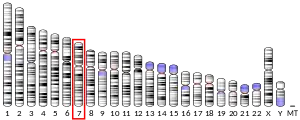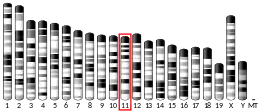RAMP3
Receptor activity modifying protein 3, also known as RAMP3, is a human gene.[5][6]
The protein encoded by this gene is a member of the RAMP family of single-transmembrane-domain proteins, called receptor (calcitonin) activity modifying proteins (RAMPs). RAMPs are type I transmembrane proteins with an extracellular N terminus and a cytoplasmic C terminus. RAMPs are required to transport calcitonin-receptor-like receptor (CRLR) to the plasma membrane. CRLR, a receptor with seven transmembrane domains, can function as either a calcitonin gene-related peptide (CGRP) receptor or an adrenomedullin receptor, depending on which members of the RAMP family are expressed. In humans and other mammals, there are 3 RAMPS, while in fish there are more, with sub-variants. In the presence of this (RAMP3) protein, CRLR functions as an adrenomedullin receptor with low affinity for CGRP.[5]
References
- GRCh38: Ensembl release 89: ENSG00000122679 - Ensembl, May 2017
- GRCm38: Ensembl release 89: ENSMUSG00000041046 - Ensembl, May 2017
- "Human PubMed Reference:". National Center for Biotechnology Information, U.S. National Library of Medicine.
- "Mouse PubMed Reference:". National Center for Biotechnology Information, U.S. National Library of Medicine.
- "Entrez Gene: RAMP3".
- McLatchie LM, Fraser NJ, Main MJ, Wise A, Brown J, Thompson N, Solari R, Lee MG, Foord SM (May 1998). "RAMPs regulate the transport and ligand specificity of the calcitonin-receptor-like receptor". Nature. 393 (6683): 333–9. Bibcode:1998Natur.393..333M. doi:10.1038/30666. PMID 9620797. S2CID 4364526.
Further reading
- Kuwasako K, Kitamura K, Nagata S, Kato J (2008). "Functions of the extracellular histidine residues of receptor activity-modifying proteins vary within adrenomedullin receptors". Biochem. Biophys. Res. Commun. 377 (1): 109–13. doi:10.1016/j.bbrc.2008.09.105. PMID 18835256.
- Roh J, Chang CL, Bhalla A, et al. (2004). "Intermedin is a calcitonin/calcitonin gene-related peptide family peptide acting through the calcitonin receptor-like receptor/receptor activity-modifying protein receptor complexes". J. Biol. Chem. 279 (8): 7264–74. doi:10.1074/jbc.M305332200. PMID 14615490.
- Stelzl U, Worm U, Lalowski M, et al. (2005). "A human protein-protein interaction network: a resource for annotating the proteome". Cell. 122 (6): 957–68. doi:10.1016/j.cell.2005.08.029. hdl:11858/00-001M-0000-0010-8592-0. PMID 16169070. S2CID 8235923.
- Scherer SW, Cheung J, MacDonald JR, et al. (2003). "Human chromosome 7: DNA sequence and biology". Science. 300 (5620): 767–72. Bibcode:2003Sci...300..767S. doi:10.1126/science.1083423. PMC 2882961. PMID 12690205.
- Kuwasako K, Cao YN, Nagoshi Y, et al. (2004). "Characterization of the human calcitonin gene-related peptide receptor subtypes associated with receptor activity-modifying proteins". Mol. Pharmacol. 65 (1): 207–13. doi:10.1124/mol.65.1.207. PMID 14722252.
- Kuwasako K, Kitamura K, Nagoshi Y, Eto T (2003). "Novel calcitonin-(8-32)-sensitive adrenomedullin receptors derived from co-expression of calcitonin receptor with receptor activity-modifying proteins". Biochem. Biophys. Res. Commun. 301 (2): 460–4. doi:10.1016/S0006-291X(02)03072-3. PMID 12565884.
- Wang YF, Zhang J, Li J, et al. (2004). "[Increased atria expression of receptor activity-modifying proteins in heart failure patients]". Zhonghua Yi Xue Yi Chuan Xue Za Zhi. 21 (4): 351–4. PMID 15300632.
- Foord SM, Marshall FH (1999). "RAMPs: accessory proteins for seven transmembrane domain receptors". Trends Pharmacol. Sci. 20 (5): 184–7. doi:10.1016/S0165-6147(99)01347-4. PMID 10354609.
- Bomberger JM, Spielman WS, Hall CS, et al. (2005). "Receptor activity-modifying protein (RAMP) isoform-specific regulation of adrenomedullin receptor trafficking by NHERF-1". J. Biol. Chem. 280 (25): 23926–35. doi:10.1074/jbc.M501751200. PMID 15805108.
- Bomberger JM, Parameswaran N, Hall CS, et al. (2005). "Novel function for receptor activity-modifying proteins (RAMPs) in post-endocytic receptor trafficking". J. Biol. Chem. 280 (10): 9297–307. doi:10.1074/jbc.M413786200. PMID 15613468.
- Kuwasako K, Cao YN, Chu CP, et al. (2006). "Functions of the cytoplasmic tails of the human receptor activity-modifying protein components of calcitonin gene-related peptide and adrenomedullin receptors". J. Biol. Chem. 281 (11): 7205–13. doi:10.1074/jbc.M511147200. PMID 16410241.
- Hillier LW, Fulton RS, Fulton LA, et al. (2003). "The DNA sequence of human chromosome 7". Nature. 424 (6945): 157–64. Bibcode:2003Natur.424..157H. doi:10.1038/nature01782. PMID 12853948.
- Suzuki Y, Yamashita R, Shirota M, et al. (2004). "Sequence comparison of human and mouse genes reveals a homologous block structure in the promoter regions". Genome Res. 14 (9): 1711–8. doi:10.1101/gr.2435604. PMC 515316. PMID 15342556.
- Gerhard DS, Wagner L, Feingold EA, et al. (2004). "The status, quality, and expansion of the NIH full-length cDNA project: the Mammalian Gene Collection (MGC)". Genome Res. 14 (10B): 2121–7. doi:10.1101/gr.2596504. PMC 528928. PMID 15489334.
- Ota T, Suzuki Y, Nishikawa T, et al. (2004). "Complete sequencing and characterization of 21,243 full-length human cDNAs". Nat. Genet. 36 (1): 40–5. doi:10.1038/ng1285. PMID 14702039.
- Strausberg RL, Feingold EA, Grouse LH, et al. (2002). "Generation and initial analysis of more than 15,000 full-length human and mouse cDNA sequences". Proc. Natl. Acad. Sci. U.S.A. 99 (26): 16899–903. Bibcode:2002PNAS...9916899M. doi:10.1073/pnas.242603899. PMC 139241. PMID 12477932.
- Udawela M, Christopoulos G, Morfis M, et al. (2006). "A critical role for the short intracellular C terminus in receptor activity-modifying protein function". Mol. Pharmacol. 70 (5): 1750–60. doi:10.1124/mol.106.024257. PMID 16912219. S2CID 7249716.
- Harikumar KG, Simms J, Christopoulos G, et al. (2009). "Molecular basis of association of receptor activity-modifying protein 3 with the family B G protein-coupled secretin receptor". Biochemistry. 48 (49): 11773–85. doi:10.1021/bi901326k. PMC 2790544. PMID 19886671.
- Flahaut M, Pfister C, Rossier BC, Firsov D (2003). "N-Glycosylation and conserved cysteine residues in RAMP3 play a critical role for the functional expression of CRLR/RAMP3 adrenomedullin receptor". Biochemistry. 42 (34): 10333–41. doi:10.1021/bi0347508. PMID 12939163.
- Qi T, Christopoulos G, Bailey RJ, et al. (2008). "Identification of N-terminal receptor activity-modifying protein residues important for calcitonin gene-related peptide, adrenomedullin, and amylin receptor function". Mol. Pharmacol. 74 (4): 1059–71. doi:10.1124/mol.108.047142. PMID 18593822. S2CID 33491956.
External links
- RAMP3 human gene location in the UCSC Genome Browser.
- RAMP3 human gene details in the UCSC Genome Browser.
This article incorporates text from the United States National Library of Medicine, which is in the public domain.



